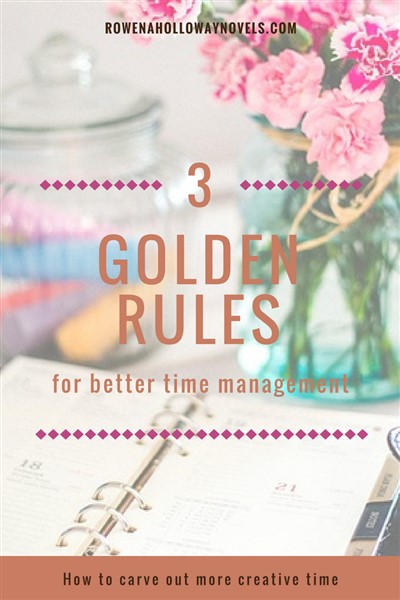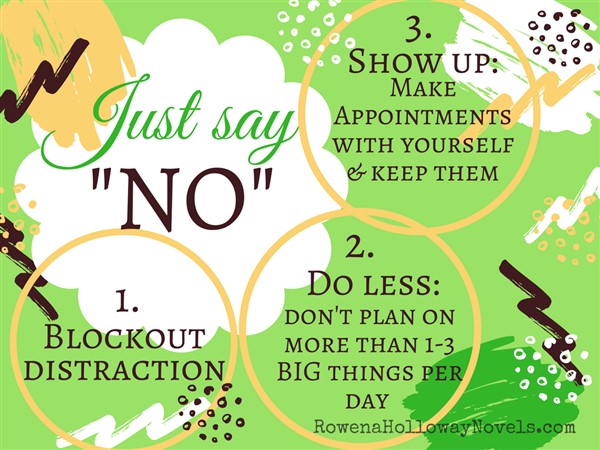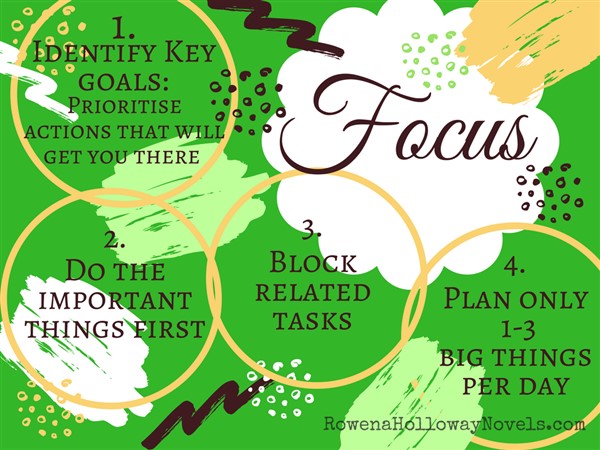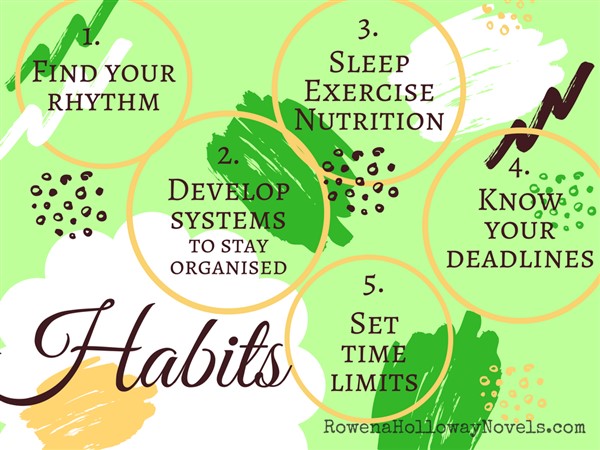More Effective Time Management for Creative Types
Do you ever find yourself frustrated by how long things seem to take to get done? What about that mild feeling of disappointment when you don’t tick off everything (or anything) on your to-do list? Perhaps you are overwhelmed by the to-do list and have ceased to look at it. If so I completely understand.
 One of my goals for 2016 was to make more effective use of my time: to write faster, to be more focused in my goals and achieve more. Its still my goal in 2017. I’m getting there. Slowly.
One of my goals for 2016 was to make more effective use of my time: to write faster, to be more focused in my goals and achieve more. Its still my goal in 2017. I’m getting there. Slowly.
In keeping with what I’ve learned, when I sat down to write this article (It first appeared in my newsletter towards the end of 2016) I focused on one goal: write this blog post. Though I was well prepared it proved to be a time consuming exercise, not least because despite the best of intentions it was mid-afternoon before I sat down to write. It was well after midnight before I finished.
Why? Because I broke three golden rules of time management (old habits die hard!)
Three golden rules
1.Saying “No”
Of all the time management tips I’ve tried this is probably the hardest.
Richard Branson’s advice to us entrepreneurs is ‘Say yes, and figure out how to do it later’. And because I fear missing an opportunity I’ve also bought into the late Steve Job’s adage of ‘Bite off more than you can chew and then chew like crazy’. The thing is, for me this just does not work. My energies are scattered, I can’t focus, and I’m constantly pulled between so many projects I often can’t decide which one to tackle first.
Saying no doesn’t just mean saying no to doing things for other people or saying no to coffee dates. It also means blocking out distractions—phone calls, email, social media, and all the other displacement behaviour we engage in without realising. As a writer working at home, distraction also comes in the form of helpful husbands who want to bring you coffee or just feel like belting out the theme to Greenacres while you are lost in your novel. Saying no can be as simple as shutting a door or when interruptions persist, putting up a Do Not Disturb On Pain Of Death notice. (I feel the Pain of Death addition is important, especially when someone you live with is prone to bursting into TV jingles.)
 The day I sat down to write this, I failed at saying no. My morning was filled with a beach walk with Alfie (my dog), a load of washing, two episodes of Masters of Flip, checking Facebook and organising a catch-up with friends, checking the letterbox, watching a video on building a better business and then another on scheduling, both of which popped up when I sat down to write.
The day I sat down to write this, I failed at saying no. My morning was filled with a beach walk with Alfie (my dog), a load of washing, two episodes of Masters of Flip, checking Facebook and organising a catch-up with friends, checking the letterbox, watching a video on building a better business and then another on scheduling, both of which popped up when I sat down to write.
You can imagine how bad I am at saying no to other people!
In our culture saying ‘Yes’ is applauded and saying ‘No’ is seen as selfish, so is it any wonder we struggle with it?
Saying No takes practice.
Start with the small distractions—turn off the internet; learn to ignore the phone or put it on silent; if you’re writing or reviewing go to a coffee shop or library where you can’t wander off to do housework or check the letter box.
Saying no is a whole lot easier when we are clear on what’s important to us. Which brings us to the next golden rule…
2.Working out your priorities a.k.a goal setting
My yoga teacher, Shannon, once told me about something called a ‘legacy journal’. The idea is that you think about what it is you want to leave behind when you leave this earth and by doing so you can identify your life priorities. Shannon shared that she’d always struggled to say no and had observed that others in her circle who had explored their legacy seemed much more comfortable about saying no and could do it with grace and without guilt. They were comfortable on their life path and could more easily see where their energies could be best used.
I certainly can’t claim to be there. Yet I have found a legacy journal helped me clarify my priorities. For me, thinking about leaving something behind—whether it was physical or how others thought of me—was very confrontational and when I found the courage to tackle this idea of a legacy journal I filled a 300 page A4 notebook with thoughts, ideas and questions. It can be surprising what comes up in the process.
What I ended up realising was this: I love challenging myself by learning new things; I love helping others by passing on what I’ve learned; I love being creative and would like to write well enough that I leave behind a few good books.
Just by doing this I can see where I need to put my energies. Sure, I’m still to bring much of that to fruition, and as I also love painting and drawing I am a little torn when it comes to focusing my creativity. (As I write this, I wonder why I’m currently spending a disproportionate amount of my time on business activities… Something for me to think about when planning for 2017!)

One of the key ideas in time management is to do the important things first. Get the ‘big’ things done and you can often fit the smaller things in during those down times. Yes, I should have walked Alfie and then sat straight down at my desk to write this blog post. The washing, messaging and facebook checking could have waited until I took a break.
Set a timer. This is great when you are having trouble getting into the headspace to undertake the task you’ve set yourself. I wrote about how this helped me with writing and I’m finding it useful too when undertaking tasks I’ve been putting off. I set my timer for 50 mins. Probably because I used to teach in 50 minutes sessions when I worked at university.
Focusing on one project at a time is more efficient than trying to multi-task. Todd Hermann talks about how for every project we add to our day we lose an extra 20% of time. So if we have one project we can devote 100% of our time to that project. It’s easier to stay focused and we are clear where our energies need to go. When we have two projects on our to do list we lose 20% of time as we switch between them. So really we only have 40% of our time available for each project. The percentages may be a little arbitrary but I’ve certainly found that when I stop a project, like researching time management, to do something else, it then takes me 20-30 minutes to get back into the time management thought process.
3.Habits
Such a simple word, but good ones are so hard to develop. There seems little agreement on whether good habits take twenty-one days or six weeks or six months to develop. Bad habits, on the other hand, are way too easy. Then again, sitting on the couch dissecting Harry Potter and eating Malteesers is so much easier than going for a 5km run! Yet in both cases the essential ingredient in developing a habit is consistency.
And the key to consistency is finding your own rhythm. The more we reflect upon our actions the deeper our learning about our behaviour and how we can change it.

Many self-help and time management gurus extol the virtues of rising at 5am. I’ve tried it. I hate it. In the past I have gone to bed at 5am after working all night, and I much prefer that to rising before the birds and trying to get my thoughts to focus. But there are plenty of areas where I waste time, and spending a few minutes organising my files and filing things away when I get them instead of waiting until I can’t find anything is far more beneficial than dragging myself out of bed.
One way of discovering how you do use your time is to spend a week making notes of all the ways you use your time and then categorise your activities according to the Steven Covey quadrant.
Short term crises and problems:
these are important and urgent, often unplanned and require your immediate attention. Things like this will come up. Life does get in the way. But these are the things we need to manage.
Long term and strategic goals:
These are the activities that will get you where you want to be. They are important and often not urgent. I say ‘often’ because we will also have short term goals that may have deadlines we need to be aware of. These are where we need to focus our efforts. We want the bulk of our energies to go into this quadrant.
Distractions and interruptions:
These speak for themselves—we want to avoid these. Social media, phone calls, emails will most often fall into this category. These are often urgent (usually to someone else) but not important. One of the best skills we can learn is when to ignore something, and again this will go back to your goals—if the email is important to you achieving your goal then act on it, if not ignore it or at least let it sit until you have some down time.
Time wasting activities:
These are not important and not urgent, but how many of us are guilty of spending lots of time on activities that fall in to this quadrant? Me, certainly. These are activities we want to limit.
Remember, time management is about managing your life, not just your job.
Allow yourself down time. Eat well. Sleep. Exercise. Spend time with those you love. But don’t forget to schedule your priorities. You schedule time for coffee with friends so make time to achieve all the other things that are important in your life.
I hope all this had been helpful to you.
Cheers,


How is your time management? What do you do (or not do) that helps you get more done? Conversely, what are your challenges?
Share your thoughts in the reply box below. I love to hear from you.
And any advice you can give me will be gratefully received 🙂
Download your printable poster “3 Ways to Better Time Management”
If you enjoyed this article, why not join my suspense community? I share with you my favourite books, latest news and reviews, and each newsletter includes an article about writing, reading or the inspiration behind one of my novels. And as a community member you get this before anyone else. You can also grab a free eBook anthology of short stories by yours truly!

Ten gripping tales of love and relationships. Includes tasters of each of my novels.

Brilliant Rowena. The best thing I ever did was to get my home screen on my phone tidied up – only essentials –
1. Picture of hot guy telling me “you should be writing”
2. Only calendar, settings and camera icons there.
3. Turn off notifications/sounds/mail/Facebook alerts.
Since I started to get my life filled with doing rather than reading about everybody else’s doings, I have become more productive and cannot believe how much more I can pack into my day. Including worthwhile leisure time for reading, jigsaws, and the occasional episode of a great series or a nice movie now and then. It really works. I save Facebook catch ups and Upwords games for early morning or late night – an extra – not the main course of my day. The less online activity I do, the less it generates so it’s s breeze to keep up with the things/people that matter.
Now to address that pesky exercise slot – maybe I need a bigger homescreen – iPhone 7 would do it nicely – my extra stern dude will be saying… “You should be writing and working out.”
Hi Jay, and thanks 🙂
Hey, everyone needs that hot guy telling them You should be writing. I get too distracted… Turning off social media and email is the best things I do–that and putting on some Jazz in the background. Days when I don’t do that are far less productive. Alfie makes me exercise twice a day and I have to say it’s good to get outside. Good luck with your exercise app or bigger screen or both 🙂 I’m not game to try the treadmill as I write; a recipe for a face plant, I reckon. Happy writing and thanks for commenting. R xo
Hmm I shall look into that page columns thing…